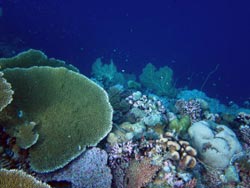Bringing corals back from the brink

<br>
A new report by Australian and Swedish marine scientists in the journal Frontiers in Ecology and the Environment suggests that it may be possible to restore living coral cover to a badly-degraded reef system – though not easy.
With 70 per cent or more of the world’s coral reefs now assessed as degraded, adopting a business-as-usual approach to how we use and manage reefs is no longer an option, says lead author of the report Nick Graham.
“We are unlikely to be able to keep many of the world’s reefs in a pristine state, but with good management we may be able to maintain them in a coral-dominated condition and in some cases we may be able to bring back reefs from a degraded state,” he explains.
The researchers have taken heart from examples on land in desertified landscapes; exceptional falls of rain, in combination with controls on grazing pressure, can result in widespread regrowth of natural vegetation.
They argue that coral reef managers may be able to take advantage of shocks like tropical storms, periods of cloudy weather or even strong seasonal effects on abundance to restore coral cover on degraded reefs.
“Normally we think of these shocks as damaging to coral reefs – but research suggests they are just as damaging to the organisms that can replace coral. In other words, they may act as a circuit-breaker that allows corals to regain control of a reef.”
The key to the new thinking is resilience: healthy corals reefs are naturally resilient to shocks – but damaged ones may become overgrown with sea weeds, and the corals vanish.
“Weed-dominated systems are pretty resilient too and, once established, it is very hard to restore the corals,” Dr Graham explains.Macroalgae dominated
“However a weed-dominated reef can be damaged by big storms too. Cloudy weather and seasonal changes in water temperature can also cause the weeds to die back.
“This dieback of weeds opens a window through which corals can re-establish.”
The key to bringing back corals is exactly the same as preventing coral cover being lost in the first place, Dr Graham says – reducing human impacts through regulation of fisheries and water quality. If reefs are prepared in this way, they may bounce back when a window for recovery opens.
Prof David Bellwood emphasized that “When it comes to saving our coral reefs, prevention is always better than cure and early action is important to slow or reverse degradation.”
The researchers emphasize that both protection and recovery of the world’s coral reefs call for a fundamental change in how people interact with and use reef ecosystems.
“Until now, the focus has mainly been on conserving small parts of a reef in marine protected areas,” said Prof Bellwood, “- we’re talking about broader approaches to change the relationship between humans and coral reefs to reduce human impacts across the whole ecosystem.”
The paper concludes, “Although the composition of coral reefs will likely continue to vary over time, it may be possible to maintain coral-dominated reefs and their associated ecosystem goods and services… Scientists and managers could take advantage of opportunities for change by harnessing shocks and natural variability as potential stimuli for beneficial shifts in ecosystem states.”
The paper “Managing resilience to reverse phase shifts in coral reefs” by Nicholas AJ Graham, David R Bellwood, Joshua E Cinner, Terry P Hughes, Albert V Norström and Magnus Nyström appears in the journal Frontiers in Ecology and the Environment.
More information:
Dr Nick Graham, CoECRS and JCU, +1 831 917 0117 (Currently in USA)
Prof David Bellwood, CoECRS and JCU, + 61 7 4781 4447
Jenny Lappin, CoECRS, +61 (0)7 4781 4222
Jim O’Brien, James Cook University Media Office, +61 (0)7 4781 4822 or 0418 892449
Media Contact
More Information:
http://www.coralcoe.org.au/All latest news from the category: Ecology, The Environment and Conservation
This complex theme deals primarily with interactions between organisms and the environmental factors that impact them, but to a greater extent between individual inanimate environmental factors.
innovations-report offers informative reports and articles on topics such as climate protection, landscape conservation, ecological systems, wildlife and nature parks and ecosystem efficiency and balance.
Newest articles

Combatting disruptive ‘noise’ in quantum communication
In a significant milestone for quantum communication technology, an experiment has demonstrated how networks can be leveraged to combat disruptive ‘noise’ in quantum communications. The international effort led by researchers…

Stretchable quantum dot display
Intrinsically stretchable quantum dot-based light-emitting diodes achieved record-breaking performance. A team of South Korean scientists led by Professor KIM Dae-Hyeong of the Center for Nanoparticle Research within the Institute for…

Internet can achieve quantum speed with light saved as sound
Researchers at the University of Copenhagen’s Niels Bohr Institute have developed a new way to create quantum memory: A small drum can store data sent with light in its sonic…





















